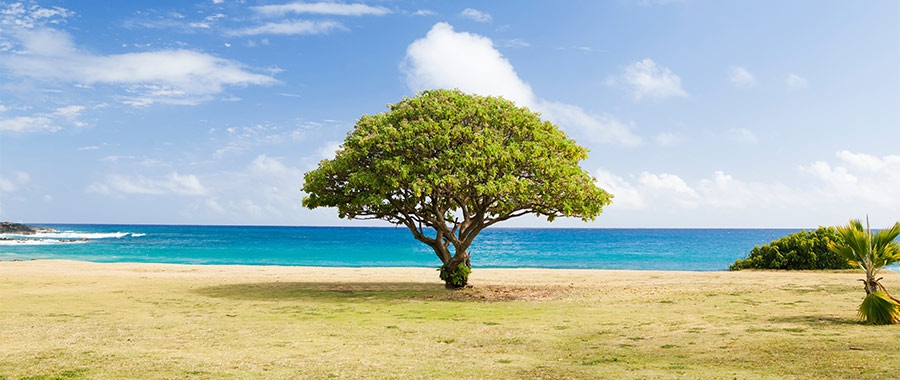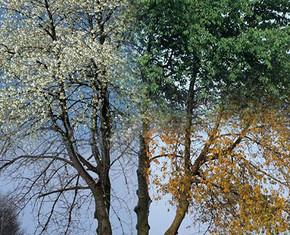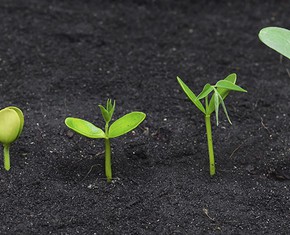The views expressed in our content reflect individual perspectives and do not represent the authoritative views of the Baha'i Faith.
In a place called Paradise, Baha’u’llah made public what many of his family and friends had quietly known: that he had come to lead humanity to its long-promised day of peace and justice.
In 1863, in the green, rose-scented Garden of Ridvan (which means Paradise) on the banks of the Tigris River in Baghdad, Baha’u’llah transformed his upcoming banishment into the modern, global Baha’i community’s greatest festival.
So how did we get here from back there? The Baha’is then were few in number, decimated by persecution, and frankly their fellowship seemed like a rather hopeless little twig.
To explain it, I seized on five pivotal years in the steady, mainly unspectacular growth of the Baha’i community into the beautiful, strong young tree it has become today. Here is annual snapshot number one:
1892. My Dad’s parents were young, and were soon to meet. It’s a little over 125 years since then, the year when Baha’u’llah departed from this earthly life, leaving his son and family and a still-tiny band of followers to carry on his mission. At that point, he was not much more widely known than Jesus Christ had been on the cross. His son, Abdu’l-Baha, still a prisoner of the Turkish empire, had to encourage and inspire a few thousand believers, across a few Middle Eastern countries, to live as his father had prescribed—and to tell the whole world about his message of peace, justice and the essential oneness of humanity. Good luck with that, folks! But, undaunted, they began.
1912. My father turned two that year. In 1912, little more than a century ago, Abdu’l-Baha, having been released from prison a few years before, travelled to Europe and North America. In Paris and Montreal and New York and Chicago and Los Angeles, he predicted a great global transformation, both spiritual and material. Two world wars loomed. Women hadn’t yet achieved the right to even vote. Corrupted religious institutions and colonial structures oppressed most of the planet’s peoples. Yet Abdu’l-Baha spoke of the elimination of all prejudices, the equality of women and men, and the coming of age of the entire human race. Imagine! A few handfuls of Baha’is existed in all of Europe and North America. That’s a pretty small tree, even one destined to grow into an oak!
1936. Eight decades ago, Abdu’l-Baha’s successor Shoghi Effendi explained how the teachings of Baha’u’llah were to be applied, outlining humanity’s glorious future. Some Baha’is had thought that Shoghi Effendi should call for the formation of the Universal House of Justice, a democratically-elected global institution that Baha’u’llah ordained in his writings. In effect, the Guardian answered, This is not how growth works. A tree needs roots and a strong trunk before it can give shelter and fruit. We are nourishing the roots of the system. At that point my parents were youth, and they had never heard of the Baha’i Faith. But by then, thousands of believers lived in 40 countries, and more than that lived in Iran alone, the cradle of the Faith. Over 100 cities had Spiritual Assemblies, and ten countries had communities substantial enough to elect National Spiritual Assemblies, the remarkable institutions formed through a kind of spiritual democracy that the world can still barely imagine. Baha’i literature existed in 40 languages. The tree was growing, but with another World War coming, how many even knew it was there?
1963. A little over 50 years ago, I was in first grade with the terrifying Mrs. Williamson. The Baha’i community, a century after that first Ridvan in 1863, had reached another stage of growth in response to crisis. The Guardian Shoghi Effendi, beloved guide of the Faith’s global expansion, had died. An International Council of trusted Baha’is, convened to help determine the next big step, did two amazing and unprecedented things. First, they willingly renounced their authority. Second, more than 50 countries now had National Spiritual Assemblies, so the council called for these maturing institutions, whose readiness Shoghi Effendi had long awaited, to elect the Universal House of Justice that has guided the Baha’i world ever since. The Faith’s roots had grown deep on every continent, its sacred writings now available in hundreds of languages. So in 1963, via the planet’s first global election, the world system envisioned by Baha’u’llah finally began to emerge. Slowly, slowly, humanity turned its eyes towards an evolving Faith with answers for humanity’s most pressing issues.
1995. Almost 25 years ago, I hit the marital jackpot; more importantly, a new stage of growth also got underway in the Baha’i world. With nearly 200 National Spiritual Assemblies, well over 100,000 local communities, over 800 languages in which Baha’u’llah’s message could be read, and millions of believers, the Universal House of Justice said it was time for Baha’u’llah’s Faith to “emerge from obscurity,” to boldly look outward, and to offer shelter and service beyond our own membership. The Baha’i community—incredibly diverse, increasingly recognized, flexibly learning and growing and yet still absolutely united—publicly congratulated and advised the United Nations on its 50th. What’s more, the House of Justice openly offered the growing Baha’i world’s “tree” as a model for peaceful, united human development. Here, they said, is an example to inspire the entire human race in pursuit of its fondest hopes: global peace, justice and equality. Here is how you can put into practice the ideal of the oneness of humanity. It felt a little terrifying, honestly! Baha’is have lots of growth and learning ahead of us—but look how far we’ve come, from the seed planted by Baha’u’llah during those magical 12 days in 1863!
As a young man, I was challenged to think of the Baha’i community as playing The Long Game, as an oak tree rather than some wild annual profusion of vines and bulbous fruits. Now it’s 2019, and I think it’s safe to say: this ain’t no pumpkin! The youthful Baha’i tree needs all of us to nourish its growth, but it bears rich and progressive fruits, has borne all the storms that have tried to uproot it, and increasingly embraces and consoles innumerable others. Maybe this analogy is imperfect; if you look, you can see a whole forest of symbiotic Baha’i communities in just about every place on Earth. Or maybe you prefer to conceive of it as a garden of rose bushes, gorgeous and fragrant and firm, for as Baha’u’llah announced over a century ago:
Hear Me, ye mortal birds! In the Rose Garden of changeless splendor a Flower hath begun to bloom, compared to which every other flower is but a thorn, and before the brightness of Whose glory the very essence of beauty must pale and wither. Arise, therefore, and, with the whole enthusiasm of your hearts, with all the eagerness of your souls, the full fervor of your will, and the concentrated efforts of your entire being, strive to attain the paradise of His presence, and endeavor to inhale the fragrance of the incorruptible Flower … – Baha’u’llah, Gleanings from the Writings of Baha’u’llah, pp. 320-321.
You May Also Like
Comments

















1 Some have asserted that, while mighty signs and marvellous deeds have appeared from Bahá’u’lláh, through which His greatness shines forth as resplendent as the sun, yet the Revelation of Christ is superior to and incommensurate with His.
2 Indeed the signs of greatness in Christ are beyond the ken of mortal mind and the grasp of human imagination. And indeed we are most humble and lowly before His sweet and beauteous countenance, and we love Him with all our ...heart and soul; nay, should it be called for and should divine confirmations assist us, we would readily lay down our lives for His sake. For we regard Him in the light